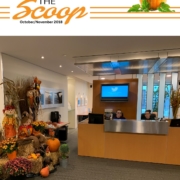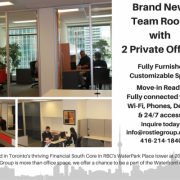The August/September Scoop is Out!
Enjoy This Month’s Scoop And Learn About Exciting Events Happening Around Toronto’s Waterfront.
If you would like to advertise in our growing newsletter we are always happy to showcase local companies and community partners. For more information on advertising, email marketing@rostiegroup.com to request a copy of our Media Kit!
You can also read all the editions of The Scoop, on your phone or tablet, through the Google News App. You can even take them with you and read them offline! Just click here to go directly to our Google News feed.
Angela Cannon (right) is joining as Catering & Facilities Coordinator. If you’re looking to get excellent food for your meeting, she’s your go-to person.
The Rostie Group would like to welcome to our staff three new wonderful people:
Jenny Mcfaul (left) is joining our Client Services Team You may have seen her at Reception already. Don’t hesitate to ask Jenny for anything you need.
Katie Duff (center) is also joining our Client Services Team. Katie has been in Canada only 2 months, and we’re definitely glad she’s here!
We look forward to what the future holds for all three with The Rostie Group!
The Anatomy of a Virtual Office
A Virtual Office is generally considered to be a package that allows the purchaser to use a business centre’s mailing address as if it were their own. These packages frequently also include services like live reception, a local number, and meeting room hours.
What a virtual office really is, though, is globalization writ small.
How we conduct business has been fundamentally changed since our parents’ time, and the Virtual Office is a very poignant indicator of that. Companies, depending on the industry, can no longer afford to operate solely in one geographic area. In 2018, this expansion is also fundamentally internationalization, in a way that did not occur in, say, the 1950s- this presents numerous opportunities for firms; however, it also presents challenges. The Virtual Office is a symptom of this internationalization, and it arose in response to perhaps the largest of those challenges. For while, a business can be international and exist in many places at once, especially if it does not sell a physical product,
its staff and its offices cannot be.
Enter the Virtual Office. They were first conceived as a way for companies to expand to other regions without having to hire local staff or leasing office space- perfect for branching out quickly into new markets.
They’re still used for this today- people like seeing that the company they’re doing business with has a local address and phone number- even if that company is actually based half a world away.
So, Virtual Offices get used by companies who want to have a presence in other markets. But if you’ve heard of a Virtual Office before, it probably wasn’t being used that way. By far, the most frequent users of Virtual Offices are home business owners. With the advent of the internet, you no longer necessarily need a brick-and-mortar location for your business. People work from home much more frequently now than ever before, and Virtual Offices were enthusiastically adopted amongst that demographic.
Home business owners
choose to work from home- but they may not want their clients to know that.
Virtual Offices are the perfect fit
for that sector; the convenience of no commute married to the outward professionalism of having live receptionists and an address that isn’t in a residential area.
Virtual Offices are the perfect fit for that sector; the convenience of no commute married to the outward professionalism of having live receptionists and an address that isn’t in a residential area.
Virtual Offices are the natural response to a variety of factors present in today’s business climate- they help new businesses look legitimate (previously very expensive), help others expand to new markets, and demonstrate that the business world’s borders have less and less to do with imaginary lines on a map than ever before.
John Lopes Vieira (The Rostie Group)
Where is the most interesting place you’ve been? That time I was in London for 4 hours was pretty cool.
What is something that you think everyone should do at least once in their lives? Bungie Jumping. I mean, I’ve never done it, but everyone else should probably do it.
If you had one superpower, what would it be? The ability to make people believe anything I say.
What would you do if you knew you only had 24 hours left to live? Curl up into a ball, try not to cry, cry a lot.
If you could have dinner with anyone, past or present, who would it be? Rob Paulsen.
The Office Industry is Changing
Okay, so when is the industry not changing? This may be a general statement in the world of ever-growing technology and real estate pricing. But, the business centre in a conventional sense is becoming very hard to define.
What is your work environment like? Are you a start up or do you have 40 employees? Do you primarily work at the same desk or find yourself always on the go?
In the past, there have been clear cut destinations that business owners have found themselves drawn to, based on a multitude of criteria. For example, finance companies worked in structured environments with rows of cubicles surrounded by water coolers; graphic designers worked at large
communal tables in brick and beam buildings that formerly hosted industrial assembly lines. They didn’t mix.
But what if these companies could find themselves rubbing shoulders with each other? Could a world filled with both left and right brain thinkers possibly get along together? The shared office space industry certainly thinks so, and companies are beginning to prove them right.
With industry giants such as Regus & WeWork competing at either ends of shared office space spectrum,
we find numerous office providers who are starting to position themselves somewhere in between – with no clear cut definition of their target market.
A once relatively unknown industry is now being considered by multibillion dollar per-year companies, as it presents a cost-cutting method to operate their businesses with a strict fiscal bottom line in mind.
Once considered feared competitors to be reckoned with, the global recognition and media attention that these industry giants are garnering actually benefits the smaller shared office space providers.
How, you ask, can small businesses benefit from the ever growing giants within an industry?
I pose this question to you: Have you ever had a pizza from Domino’s? You know the price, the quality, the speed of delivery, the shape, size, and consistency, but you’re never wowed by the end result. It is a quick alternative that hides itself behind flashy marketing and a cell phone app. They don’t know you, the customer. They don’t know the specifics of your order (unless you tell them, time after time). They are a generic food factory servicing the masses, without the ability to cater to each of their clients’ immediate needs specifically.
Now, have you ever eaten at at your local pizzeria,owned and operated by a family in your very
own neighbourhood? These are the same people that know you by name, face and voice. They know that you live on the same street and know that you don’t like too many black olives. They may even be charitable enough to sponsor your child’s soccer team, or better yet, allow you to pay them back next time when you find you’re short on cash. At the end of the day, they’re friends.
The point, very simply, is that people like to pay for a service that is specific to their likes, wants and needs. Sometimes choosing the largest company in the industry is not the best way to proceed.
This is where privately owned business centres secure their slice within the industry (pun absolutely intended). It is very common to have business owners move to these smaller outfits after stints with large corporations. They do this because they are unhappy with the giant’s inability to cater their services to the specific requirements of each company’s business practice.
So, I challenge you to consider all elements of this
ever-changing industry when selecting your next office space provider. Whether you’re a financial giant or a start up app developer, why go with Domino’s when you can choose an experience that is fundamentally yours?
Like they say, you never know who you’re going to meet.
Coffee Tasting
Here at the Rostie Group, we take pride in our coffee. A good meeting needs good coffee to function properly – if it’s an early morning start, for a lot of people, that first cup is exactly what gets them going. We take so much pride, in fact, that we held an impromptu coffee tasting.
We stacked our coffee up against brews from around the neighbourhood. We were a little shocked, and very ecstatic that a blind taste test reaffirmed our faith in our coffee – we won! And not by a small margin, either.
When you’re next at The Rostie Group, come for the meeting, stay for the coffee.
Back to School Time is Back to Work Time
Available Positions Include:
What’s Happening in Toronto this August & September
We’d also like to take this time to Thank all of our Advertisers. The Scoop would not be possible without all of you.
Waterpark Athletics
E: waterparkathletics@oxfordproperties.com
P: 416-360-4047
EXtatin Inc.
P: 416-707-2969
The Staffing Exchange Inc.
Cryptoducation
Michael Scott
P: 416-998-2434
SWAT Health
Enriched Investing Incorporated
E: candiv@enrichedinvesting.com
P: 416-203-3028
Frederick Simon Hawa BSc MBA LLB (JD)
P: 416-707-2969
Concordia University
One East Hair Salon
P: 647-348-6656
Pie Bar Pizzeria & Cocktails
P: 416-533-8368
Waterfront BIA




































